Shrine: Too Tough To Die
Dedicated to the musicians, bands, clubs and loved ones who gave us hope, joy and communion. God's love you do deliver, every day.
Dee Dee Ramone
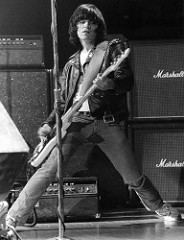
Dee Dee Ramone was found dead in his home by his wife, unconfirmed early reports list the apparent cause of his death as drug related.
Only last month we gathered at the Bowery Ballroom and CBGB's, at clubs and in scenes everywhere to celebrate Joey's life and legacy on what would have been his 51st birthday. And now this. Every fan has their own personal Ramone---the one we admire and emulate as a role model. Joey was my dear friend, and I cherish Tommy, CJ, Mark and John, but Dee Dee was my Ramone---he belonged to me. I dressed like him, cut my hair like his, and sang his lyrics as if they came from my own heart--because they did.
While the ferocious intensity of each Ramone exploded into the glorious whole we have known and loved since 1976, Dee Dee was the nuclear core of the band, the true genius whose demonic wit formed the emotional center of the Most American Band Ever.. He was pop savvy, feral, silly and brilliant. Sensitive, kind, fun and totally fucked upHe was passionate about his rock & roll, his hair and deeply in love with his wife Barbara. Dee Dee loved dachshunds and Germany. Like the rest of his bandmates, he was a great American patriot, an original, a populist and an artist. His songs gave misfits everywhere hope and communion.
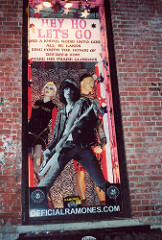
But we are one in the Ramones---So God bless America, Dee Dee, Joey, All Ramones and their mighty legions.
Today your love, tomorrow the world,
Donna Gaines
Johnny Thunders
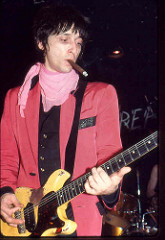
by Donna Gaines
(Excerpts from “A Misfit’s Manifesto: The Spiritual Journey fo a Rock & Roll Heart, Villard, 2003)
Johnny Thunders almost called the Heartbreakers "the Junkies" but he knew they'd never get the airplay. They never did anyway. Thunders' self-destructiveness became part of his schtick. He became a caricature of himself. Former bandmate and Voidoid Richard Hell once said "Johnny Thunders is the rock & roll Dean Martin of heroin." After a while some people just came for the spectacle, to see if he'd collapse right there on the stage. Live in Sweden in 1984 he asked "How many of you people came to see me die tonight?" Promoters capitalized on it, making him work even when he was bleeding and dope sick. We never dared to miss a show, always afraid it would be his last. We believed that for years Johnny fused the cold cockroach soul of the junkie with the relentless howl of the unlovable child. But the true brilliance came in his mistakes, accidents of creation, never repeated. And then there was his hair. Black, long, thick Sicilian locks, teased and piled even higher than the Shangri-las, those immortal hitter chicks from his neighboring Cambria Heights. Later on, he chopped it, popped a proud rooster in the crown, architecture of attitude.
One minute his music was suicidal and abject, then dopey and cruel---a misogynist prick. A garbage pail theologian, within seconds he could shift into pure rapture, transcendent, sublime. A spasm of vulnerability and brutality propelled each chord into a cotton-shot reverb. There are so many things we can't put into words, so music says it for us. If I could tell you why I love Johnny Thunders, what his music means to me, if I could actually put it all into words, I'd be the Queen of the Universe. I would know the unknowable nature of God. I would be speaking the unspeakable name in cascading Thunderbolts. Some say the universe started with a big bang, one huge bolt of thunder, kaboom, let there be life! Who knows if Johnny Thunders was just fucked up and it was all an accident, a miracle, like creation itself?
Like everyone, the addict yearns for the unknowable truth. But we can't just take it on faith, we can't wait. Forget religion, prayer or meditation. That's for suckers. We need to know for sure, we need to know now, and we always want more. The desire to merge with the Divine is so pressing, so overwhelming that we overwrite the buffer, blow out the fuse box. Drunken monkeys, grasping, desperate to know. We shouldn't hate ourselves for our spiritual hunger---a longing for God so intense it wants to kill us. But we do. Thunders understood that better than anyone.
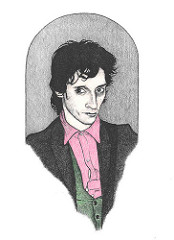
Our Father who art in heaven hallowed be thy name…fuck you…oh God.." Faith is like the weather in the Caribbean, it's here today, gone tomorrow. Intimacy is impossible, you are condemned to your private misery. Reach out for love, ask for help and you'll get smashed. Maybe we learn that as frightened children, maybe we feel it as an existential terror. Maybe we are just born with it, born to lose, born too loose.
In his early Dolls and Heartbreakers songs you hear that cock-of-the-walk boasting and preening. But in his later solo material, he's melancholy and downbeat, singing the blues. We hear the longing, for light, love, for the missing father he adored. Johnny's father cut out when he was young, left the family to run with the broads, to party and play. The little Italian boy waited every Christmas Eve, all dressed up in his finest, but Daddy never came back. The pros were scouting young Johnny for baseball, he was that good. But even a string of home runs wasn't gonna bring Daddy home. Nothing was enough to make daddy stick around.
That longing never stops, not until you're comatose. And then, even after you're high, your still gonna be waiting for the man. But Daddy's gone, he isn't coming back, not ever. You're older now, but you still think and feel like a little child, like you did when he left. He doesn't love you, that's why he isn't coming back. Not from the hospital or from heaven, from his drink or his new woman, his job or the streets. It's always your fault, your lack, your flaw. You can't even bear the thought, please, god, just to see him walk back into the room one more time. But you're lucky tonight. Just before you crumble, Johnny's guitar kicks in.
God spoke to me every time Johnny Thunders' played. It was a dark truth in an empty chasm, the abysmal, the wretched and abject. The raw wound exposed and buried over and over again in a dialectic of divinity. Light through pain, joy from suffering, clarity in misery.
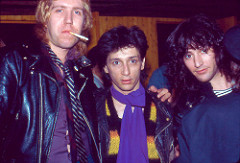
Joey Ramone
Too Tough to DieThe Last Days of Joey Ramone: Outcast, Icon and Soul of Punk
By Dr. Donna Gaines
SPIN July, 2001
Woke up thinking 'bout you today, so sad and lonely…Last New Year¹s Eve day, Manhattan was covered with fresh snow. It was risky for Joey Ramone to be walking around, but he had cabin fever, and he refused to let cancer get the best of him. Diagnosed with lymphoma in 1995, Joey fought back, got sober, ate health foods; he kept on recording, producing, and nurturing local bands. He was determined to keep his illness private, to prevent it from intruding on his fundamental conviction that "life's a gas." But Joey¹s bones were brittle from all the years of powerful medications. That afternoon, he slipped, fell down, and busted his hip. As he recovered in New YorkPresbyterian Hospital, the lymphoma came raging back. To make matters worse, his father, Noel Hyman, had died just a few months earlier, and Joey was still shattered.
Each week brought new triumphs and defeats. Visitors never knew if Joey would be wiped out in pain, asleep, or laughing on the phone. Then on Good Friday, April 13, loved ones prepared for the worst.
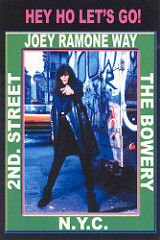
Tuesday's funeral at Schwartz Brothers Memorial Chapel took Joey Ramone full circle, back to Queens, where the Ramones formed in 1974. It was a very personal tribute to a public hero. Jewish aunts and uncles grieved along with rock stars like Deborah Harry and Joan Jett and a shattered spectrum of ex-bandmates, DJs, VJs, journalists, club owners, record company executives, former girlfriends, and fans.
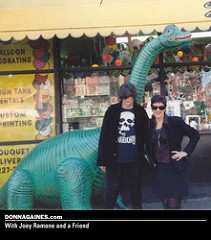
At the funeral, Vin Scelsa, the first DJ to break the Ramones on New York radio, gave the opening eulogy. He acknowledged Joey Ramone the legend, frontman of the band that ignited punk around the world. Mickey spoke of Jeffrey Hyman, the man. The shy, sickly son of an artist mother, constantly picked on in school, Jeff had three different fathers---divorce and death whisked them all away. Friends recounted how an early life of pain and humiliation was transformed by his love of rock'n'roll. Rabbi Stephan Roberts described a deeply spiritual man who considered music a miracle of life. Indeed, for 25 years Joey walked me through broken hearts and shattered dreams---first from my turntable, and later as a friend.
Lord and ruler of his East Village empire, Joey used to stroll down St. Mark's Place signing autographs for anyone who asked. "I remember meeting certain artists I admired and them being real obnoxious" Joey once told me. "That wasn't how I wanted to be." He was committed to revitalizing the downtown music scene, and his showcases at punk strongholds like the Continental and CBGB included breaking bands and local legends. Joey never missed a gig, even when he was sick, exhausted, and hurting.
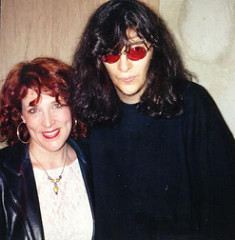
Through 18 albums and more than 2,000 live shows, until they finally parted ways in 1996, da bruddas never let the creeps get the last laugh, fighting the power through wit, sarcasm, and irony. The Ramones poked fun at the liars and hypocrites, exposing our fucked-up families, idiotic government, and repressive schools. Commando Joey may have been the spiritual leader of all proud social rejects, warthogs, cretins, and pinheads, but some scars take a lifetime to heal. He was rich and famous, but in his heart he still understood the misfit's suffering, the festering rage that drives kids to self-destruction and Columbine. By simply being himself, Joey stuck up for all the kids who didn't fit in, who felt shut out, put down, and alone. Some people have a friend in Jesus; others have one in Joey Ramone, oh ye-ah, oh ye-ah, oh ye-ah.
The Sound of the City
Dr. Donna Gaines on Joey Ramone Place
Village Voice
December 10 - 16, 2003
Not 53rd & 3rd>
Joey Ramone gets his Place (in the 9-to-5 world, and beyond) By 1 p.m., two generations of punk loyalists had swarmed the corner of East 2nd Street and the Bowery for the city's formal dedication of Joey Ramone Place, immortalizing the relationship between the King of Punk and the city that spawned him.
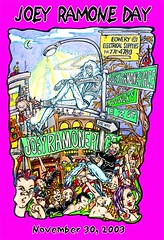
Following Joey's untimely death in 2001, a teenage fan from Staten Island spearheaded the street sign movement. On Sunday, November 30, her dream came true; now punks have something to lean against.
Meantime, inside CBGB, high mass was in progress. Joey's brother and guitarist Mickey Leigh& and Punk magazine founders Legs McNeil and John Holmstrom officiated, as a parade of family, friends, scene entrepreneurs, and luminaries offered heartfelt testimonials to the huddled masses. Marky Ramone said, "Joey was a true New Yorker, and only a New Yorker could have spawned the Ramones." Talking Heads' Chris Franz observed, "Joey Ramone was an outsider artist. He was a person who truly lived at the edge while challenging our traditional cultural values.
" The Dictators' Dick Manitoba quipped, "What's the big deal about a street sign? It should be fucking Joey Ramone Boulevard!"
Borrowing from Gandhi, Ramones artistic director Arturo Vega summed up the Ramones' last 30 years: "At the beginning, they ignore you. Then they laugh at you. Then they fight you. Then you win." Indeed, Joey's punk politics permeated this bittersweet family affair. The cultural freedom-fighter from Forest Hills demanded the airwaves and open space for kids to create and consume music. The street sign symbolizes CBGB's role in the end-of-the-century revitalization of the Bowery.
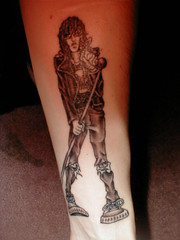
Now, as condos and luxury buildings impose themselves upon the landscape, and landlord greed and NYU encroachment threaten to shut CBGB, Lenny Kaye applauded the sign as a historical referent in an ominous future.
Sporting a CBGB T-shirt, with a proclamation signed and sealed by Manhattan Borough President C. Virginia Fields, Council- man Alan Gerson formally declared November 30 "Joey Ramone Day." At around 2:30 p.m., the sign, covered with a black Ramones T-shirt, was unveiled amid hearty chants of "hey ho let's go." A giant Joey Ramone puppet head on a stick carried a sign, a prayer; "1-2-3-4ever in our heart, soul, gut." Meantime, everyone began placing their bets: "How long do you think it will be before some punk steals that sign?"
Dr. Donna Gaines on Joey Ramone Place
Village Voice
December 10 - 16, 2003
Not 53rd & 3rd>
Joey Ramone gets his Place (in the 9-to-5 world, and beyond) By 1 p.m., two generations of punk loyalists had swarmed the corner of East 2nd Street and the Bowery for the city's formal dedication of Joey Ramone Place, immortalizing the relationship between the King of Punk and the city that spawned him.

" The Dictators' Dick Manitoba quipped, "What's the big deal about a street sign? It should be fucking Joey Ramone Boulevard!"
Borrowing from Gandhi, Ramones artistic director Arturo Vega summed up the Ramones' last 30 years: "At the beginning, they ignore you. Then they laugh at you. Then they fight you. Then you win." Indeed, Joey's punk politics permeated this bittersweet family affair. The cultural freedom-fighter from Forest Hills demanded the airwaves and open space for kids to create and consume music. The street sign symbolizes CBGB's role in the end-of-the-century revitalization of the Bowery.

Sporting a CBGB T-shirt, with a proclamation signed and sealed by Manhattan Borough President C. Virginia Fields, Council- man Alan Gerson formally declared November 30 "Joey Ramone Day." At around 2:30 p.m., the sign, covered with a black Ramones T-shirt, was unveiled amid hearty chants of "hey ho let's go." A giant Joey Ramone puppet head on a stick carried a sign, a prayer; "1-2-3-4ever in our heart, soul, gut." Meantime, everyone began placing their bets: "How long do you think it will be before some punk steals that sign?"
Johnny Ramone
1948-2004Angry boys play taps as the lights go down in Johnny's fatherland
September 17, 2004, The Village Voice
by Donna Gaines
John Cummings went to military school; he was a construction worker, a nasty Queens hitter. He flirted with drugs and hippie regalia, but he knew that wasn't God's plan. Years later, in 2002, when his band was inducted into the Rock and Roll Hall of Fame, Johnny Ramone asked God to bless President Bush. If Joey was the heart and Dee Dee the soul of the Ramones, Johnny was the balls, the propellant for punk's most dysfunctional family, drilling through 22 years of hard touring, cross-addictions, personality crises, and bad breaks. In the recent documentary End of the Century, the feral guitarist comes off as a merciless taskmaster who browbeat his bandmates into a tight paramilitary organization. He stole Joey's girl, then refused to call his former bandmate in the hospital, even as the lead singer lay dying.
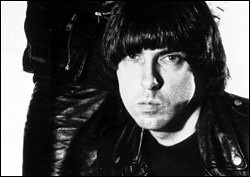
But something happened that day at the Empire. After we finished the interview, Johnny noticed my "Kill 'Em All" T-shirt. My dad was 82nd Division Army Airborne, I explained. Johnny's face opened up, like a little kid, smiling, animated, talking about how much he loved his father, how much he missed him. He showed me a photo, he talked about growing up as an only child, then signed an autograph for a fan—a nine-year-old-kid on dialysis.
Sometimes Johnny played his guitar till his fingers bled out, till the white instrument turned red. On Sunday, September 12, 2004, the remaining Ramones and their friends put on a 30th anniversary tribute concert in L.A. Johnny had been sick for a long time. Three days later, he died—his work was finished. Every Ramones fan has his or her own personal Ramone—sort of like a personal savior: Dee Dee's the outcast's outcast, a home for the displaced psyche. Joey's the patron saint of lonely kids even now; some say he's their only friend. Johnny's Army is all the angry fatherless boys, disposable heroes who work hard, fight wars, and never get anything. Johnny's their Captain; he'll never leave a soldier for dead, never betray the trust. He's the father Ramone.
Three Ramones killed-by-death in just over three years' time. First Joey from lymphoma, then Dee Dee from an overdose. Now Johnny from prostate cancer. The Ramones gave their fans hope; now our love will give them immortality.
Johnny Cash
One of Us: Why Misfits Loved Johnny CashFirst of the Month, New York, Winter 2004
Volume VI, Issue 1.
by Donna Gaines
There's a mystical property that elevates an artist like Johnny Cash above the idolatry of celebrity cult status, and confers upon him immortality. What was it about the Depression-era farm boy from Arkansas, who toured for 38 years, recorded 1500 songs, still has 45 albums in print, won eleven grammys and a Lifetime Achievement Award too?
But true greatness transcends the banal units of market shares, record sales or arbitron ratings. For some, it was Johnny Cash's cultural impact. Critics have credited him with "strengthening the bonds between folk and country music so that both sides saw their similarities as well as their differences. Johnny Cash “liberalized Nashville so it could accept the unconventional and the controversial" He blow-torched country music's rhinestone glitz the day he showed up at the Grand Ole Opry dressed in flat black. Oh, and then there was his voice.
. Bono once said, "Not since John the Baptist has there been a voice like that, crying in the wilderness---every man knows he's a sissy compared to Johnny Cash." Cash revealed America's brutal truth in the tale of a drunk found dead of exposure in a Pima reservation cotton field. The broken bag of brown skin and bones was once a man of valor; Ira Hayes, the Native American soldier who helped raise the flag at Iwo Jima. Johnny Cash also taught us the healing power of forgiveness. He spent so much time performing inside prison walls we assumed he'd done hard time---but he didn't. He went inside to heal the hearts of heartless men. Men like the one who "shot a man in Reno, just to watch him die". Cash taught us compassion. He understood firsthand that redemption was possible at anytime, for anyone, even the most abject cold-hearted killer.
He talked it, but he walked it too, using his gifts to uplift the human race, to repair the world, to honor his Creator. Johnny Cash petitioned us to feed the poor, save the child, forgive the criminal, help the drunk and remember the forgotten. His magnitude was also reflected in his character---in his devotion to his "poor valley girl," his bride and soul mate, June Carter, who died just last May. And in his spiritual generosity---in sharing his most personal truths; a soul-killing addiction and born-again salvation. He understood how human frailties defeated us, and how miraculously faith, love, family, work, and music redeemed us. It wasn't until the day he died, on that perfectly clear, crisp Friday, September 12, 2003, that I figured out what made Johnny Cash my American hero.
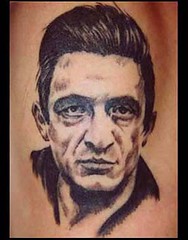
"Auntie, Let's go for a ride!" Raina Mae sings in a rockabilly band, she sounds just like her idol, the born-again Wanda Jackson. Careening through the Bonac woods, North to Sag Harbor, Johnny Cash sang to us in that voice once described as "Locusts and Honey," praying for us through the speakers of Raina Mae's red '89 monster GMC Jimmy…I hurt myself today, to see if I could feel….
Last year, after I got baptized in the crystal blue waters of Gardiner's Bay, East Hampton, my friend Anthony said, "Now that you're a Christian, Johnny Cash will be your Bob Dylan." I didn't grasp what Anthony meant until almost a year later, on the day Johnny Cash died. Anthony is a fully tattooed power lifter from the Florida Panhandle, an atheist. But he was so broken by Cash's death, he said, "I think I'm gonna call my Mama today."
Like Bob Dylan, Johnny Cash is someone who's words make us feel a little less alone, with their equally creepy voices-- alternately singing, crying, ranting, and begging us to be merciful and righteous. Both Dylan and Cash have loved God in their own way. They have reached out for light and brought back what they found in the cold wilderness. June helped Johnny through an early recovery and then she walked with him, arm in arm, right up to Jesus Christ. Dylan's startling born-again embrace of the Jewish Rabbi from Nazareth and his subsequent "Baal T'shuva" return to Judaism confused his fans--from Yeshiva boys to lefty agnostics, atheists and secular humanists. Either way, both men managed to transport us to higher ground.
As Anthony explained, where Dylan has traditionally ministered to well-educated, alienated intellectual, urban audiences, Cash served Los Olvidados of rural America---the truckers, farm workers, nickel & dimed country moms, hapless convicts, honky-tonk habitués. Both men hurled us into the dark caverns of the soul, exploring both existential terror and social misery. They've exposed our collective lies and soothed our psychic wounds. Each has understood that faith is a difficult, non-rational, haphazard, solitary process.
And this I command thee: to love one another. Where Dylan's road to salvation lies in the human connection, in the possibility of engagement, Cash's resides in a living, loving God, in the Lord Jesus Christ. But, my dear brothers and sisters, we are obligated either way. Whether we think of the body of Christ as a socially constructed reflection of the body social, or the body social as the body of Christ incarnadine, we all do have to serve somebody.
This is My Church---Tribute to Continental NYC
by Dr. Donna Gaines September 2006: Continental's last month of hosting live music. Facing rising rent costs, Trigger converts the legendary music venue into a bar. No longer would bands assemble, supported by fans and friends, tribal, communal---a spiritual community at 25 St. Mark’s off Third. On the last night, CJ Ramone, Daniel Rey and many special guests would come together to perform a full set of Ramones songs. Handsome Dick Manitoba of the Dictators, Lenny Kaye of the Patti Smith Band, Walter Lure of the Heartbreakers and Waldos and The Bullys would pay final respects to a sacred space that houses memorials to Joey Ramone and Fire Fighter John Heffernan aka Johnny Bully, as well as a gallery of punk royalty, from Iggy to Deborah Harry.I started coming to the Continental about 15 years ago, first as a fan, a girlfriend, and a plus-one. Later, I came as a music writer and sociology professor. In recent years I came as an elder--- what Daniel Rey calls “a punk matriarch.” I got wasted there, I got sober there too. Like many of the old school punks, I’m now an elder in a tribe that grew out of the local scene, the subculture that erupted out of CBGB’s in the 1970’s, with the Ramones, Blondie, Patti Smith and Television.
Last year we of NYC fought valiantly to save CBGB’s, but that was something I did “for the kids,” not for myself. CBGB’s is an intergenerational, cross-cultural institution that gave kids hope and meaning for over 30 years. We rallied to keep our punk Mecca, to have it declared a Cultural Landmark of NYC and we failed. Urban gentrification, bureaucratic sludge and real estate greed triumphed. But losing Continental is much harder and the pain is deeper. For me, it’s personal, and it hurts.
On March 18, 2003, Trigger hosted a Book Party Blitzkrieg Bash for A Misfit’s Manifesto: The Spiritual Journey of a Rock & Roll Heart which chronicled my life as a bridge & tunnel fan and local scene habitué. That night, six bands played---Collider, Brain Surgeons, Daniel Rey, Bullys, Sea Monster and the Slugs. Sociologists, journalists, clergy, members of the Surfrider Foundation, Hell’s Angels, Random House editors, recovering drunks, junkies, club kids, my former students from Barnard and Graduate Faculty, New School University and cousins from Jersey all showed up. The party lasted seven hours.
Owner Trigger is one of the most deeply spiritual, caring souls I know, he was never in it for the money. For him, Continental was always about creating and sustaining community---supporting the scene. The bonds of love derived though subcultural affiliation are as string as any I’ve felt from blood. When I introduced the bands, I took the opportunity to offer a “Tribute to the Continental.” The following is an excerpt:
“Welcome to this sacred space we call Continental. This is our church, this is where we heal our hurts and renew our faith. Tonight will be a night of tribute to the spiritual force of music and popular culture. It's dedicated to you---all the people who make the sweet stuff happen; writers, editors, critics, scene entrepreneurs, scholars, musicians, webmasters, buzzmasters, producers, fans, family and friends. I'm a musician's daughter, so this is for my parents too.
“This is a place where worlds collide. Everyone here tonight has been part of this book. You're either in it, or you helped to get it out of me and into the world. Or you inspired it, or nurtured it by supporting and loving me during the bell jar years. To thank everyone involved would take all night. So I won't repeat what's written in my dedication or acknowledgments. But let me say this; (adapted from Psalm 25)
"Let integrity and uprightness preserve me, for my hope has been in the Lord, and sanctified through my friends and my bands."
“There are bands in the room and spirits in the house. Tonight, we have members the Berzerkers, Slugs, CorpseGrinders, Stop, Kowalski's, Dictators, Pyrexia, Suffocation, NutJob, and the Ramones. The Continental and all the bands playing tonight are chronicled in A Misfit’s Manifesto.
Let me tell you a little about this place. It’s from a chapter in my memoir, titled “Life in the Post Ramones Empire of NYC.”
“As our scene patriarch, Joey Ramone kept hope alive for NYC punks. Although CBGB's was more famous, the Continental, at 25 Third Avenue, between St. Marks and Ninth Street was always my home. The club was originally called the Continental Divide. In 1990, a guy named Trigger bought the club and dropped the Divide. He took out the kitchen, moved back the stage, cleaned up the bathrooms and relocated them downstairs, bomb shelter style, concrete and steel. Trigger met Joey Ramone in the late 1980's on a spiritual retreat. Joey lived diagonally across the street from the Continental, in a high rise. Once Trigger took over Joey began booking shows. He said the club had the same vibe as CBGB's in the 1970's.
“With over 100 photos on the wall, including everyone from Guns N' Roses to house favorites like Sea Monster, the Continental is more like a local venue than an industry place like Brownies or the Mercury Lounge. It's got the look, but it still has an underground innocence, the indigenous scene credibility that made New York punk what it is. Iggy Pop liked the Continental because it reminded him of upstairs at Max's Kansas City. The first time he visited, Iggy told Trigger "This is a really cool place to do a show." Kidding around, Trigger said "Okay, bring me a demo." The humble Stooge replied "Sure, I'll drop one off tomorrow." Stunned, Trigger stammered, "I have every one of your records, you can play here anytime, anytime."
Like many bridge and tunnel marauders, I spent years foraging the backrooms of the Continental for free lines and pirate love. Puking in the basement surrounded by the ex-boyfriend club. Gotta love the stench in the bathroom--four generations of my bloodline in NYC. Down in the green room, Dee Dee had consecrated the black space with graffiti, a whimsical chalk tribute to Kessie, Uber Dachshund of Berlin. Over my period of residence, the Continental has booked local and touring bands about to break, as well as established scene dignitaries like the Dictators, DGeneration, and Blondie. To delight the fans, Joey often arranged surprise guest appearances by Joan Jett, Sebastian Bach, Lenny Kaye, Ronnie Spector, and members of Green Day & Rancid.
Over the years I've gladly sacrificed chucks of brain matter to bands like Raging Slab, PCP Highway, Nashville Pussy, Stop, MotorBetty and Felonious Punk. Of course Long Island's finest have gigged here too---- the CorpseGrinders, Slugs, Nihilistics, NutJob and Graveyard Slut. Some of my best nights were spent watching the Waldos.
Guitarist Walter Lure was Johnny's longtime consort in the Heartbreakers. A survivor of too much junkie business, Walter's lost his band-mates, Johnny, Jerry, and later, bass player Tony C. Sadly, he even outlived his younger brother, Sea Monster's bassist Richie Lure. But he kept on playing, cranking Heartbreakers classics, a defiant wank in the face of loss. Ferocious sets, dedicated to the fallen souls that once filled the Continental with wrenching power chords, these magicians fired up the stage like the Cosa Nostra. They dressed to kill, their guitars pointed at you like an Uzi. Fans crowded the stage in tribute, including kids too young to have ever seen Johnny Thunders play.
Everyone knew that by day, Walter Lure was a successful stockbroker. Sounding as tough as ever, even now, whenever Walter plays, the Saints come moshing in, departed spirits return home to the Continental---Dee Dee, Joey, Johnny Bully, Barney Wagner, Lizzie, Lila, and Coco, Jerry Nolan, Armand LeBlanc, Johnny Thunders and Joe Strummer. I once told Walter if he ever stopped playing I'd leave NYC for good. He relied "If I ever stop playing, I'll die!"
In addition to their own bands---Remainz, Intruders, and Los Gusanos, each Ramone produced or supported several others---like the Independents, Blackfire and the Bullys. When the Bullys met Marky at a studio in Brooklyn in 1998, they were too scared to talk to him. But he liked them so much he produced their first album, Stomposition. Feral as Deadboys, polished as Professionals, pure bridge-and-tunnel like the Ramones. The Bullys mixed old-school punk with a Gen X face and a strong left hook. Because three of the original members grew up in my hometown, Rockaway Beach, Marky introduced us. Johnny Heff, the principal Bully was a tough St. Camillus boy who came up stomping. The rhythm guitarist sang backups, wrote most of the material, set up their Web site, fronted cash for recording, and booked shows.
The Bullys songs were heartfelt tales of life on mean suburban streets. "It's Still My Home" was an oath of blood loyalty, a Celtic warrior's do-or-die pledge to love and defend his turf. I liked their polished sound, like early Saints or Professionals. Pumped and inked for the 1990's, the Bullys were direct descendents of the Magicians, my Celtic teenage heartthrobs from Rockaway. Unlike most leatherette punks on the scene, the Bullys could back it up. The fearless "Tonight We Fight Again" wasn't a pose, it was autobiographical. I always enjoyed hanging out with them at shows; If some guy walked by and accidentally brushed my arm, the Bullys went into full alert. Full of scrappy tough guy attitude, they were secretly very good boys.
For years, Joey had kept the local punk scene alive putting together a series of quirky, cool, sold-out extravaganzas. After Ramones retirement, he devoted himself to it wholeheartedly. Unlike most promoters, according to club owners, Joey was unconcerned with making money himself; "Make sure the bands get paid," he'd say. For him, the scene was all about supporting new bands, making sure they got a decent cut, media attention. Joey said, "Do it from your heart, follow your instincts."
“That's the spirit of the Continental, life in the post-Ramone's empire, Joey's legacy. As an old Buddhist advised me, "Participate joyfully in the sorrows of the world." Well, right now, it looks like Hell Awaits. We're about 24 hours away from all the death and destruction promised to us in black metal prophesy. But we're in Joey Ramone's House tonight. And one of the things I learned from my own personal Battisatva is this…in spite of it all, no matter what's going on, it's a Wonderful World……always, forever. We'll celebrate that spiritual truth tonight with the first language my mama taught me; music!”
Make a joyful noise unto God, all ye bands
Sing forth the honor of His name:
Make His Praise Glorious
(Adapted from psalm 66)
Last Stand at CBGB
(reprinted from Village Voice, September 1st, 2005)by Dr. Donna Gaines
"Hilly called in the monsters from hell to save the day. We'll kill anyone who stands in the way." August 12, onstage, Misfits frontman Jerry Only rants, "We're here to save CBGB 'cause CBGB saved me. Hilly believed anyone who walked through the door was allowed to play—it didn't matter who you knew. That's America!"

The club's atmosphere reeks of defiance and repression, with long lines, limited space, and stressed-out bouncers, wary that any perceived code violation could close CBGB down. Fans line up daily by 11 a.m., paying up to $35 for cherished memories and fresh possibilities—Bush Tetras, Blackout Pact, Circle Jerks. Through September, from the Philippines, Las Vegas, Mexico, and Germany, a militia will assemble, three generations strong: 13-year-old Jack just wants to see the place before it's over. For L.E.S. Stitches singer Mick Brown, now about 30, witnessing the Dead Boys live is a miracle: "I've only ever seen them in videos. I was too young." For George Tabb of Furious George, it's legitimacy: "This is our prom, the one the misfits never had."
Critics argue that in recent years, CBGB's bookings have been mediocre. But, argues owner Hilly Kristal, "Bands were mediocre in the 1970's too, so you just let them play. You see what happens." August 27, Stiv Bators's leather jacket hangs ominously over an empty mic stand, as ghosts and sound system snafus haunt the Dead Boys' set. Johnny Blitz kicks over his drum stool, grabs the mic, spewing, "Get me some fucking monitors or I'll punch the shit out of you!" Reunited after 11 years, bassy droners Flipper start and stop, pop guitar strings, fight among themselves. Crude, rude, cranky, dysfunctional. Raw, like the Ramones in 1974. A bright-eyed kid sneers, "Man, how unprofessional!" Yeah. That's exactly the point.
After 31 years on the Bowery, CBGB lost its lease at midnight, August 31. That same day, Bowery Residents' Committee executive director Muzzy Rosenblatt, who plays the role of CBGB's landlord, issued a statement refusing to renew the lease. The BRC is a $25 million-a-year nonprofit, funded by public monies to provide homeless services. Even if the lease is renewed, the $19,000 rent could at least double. Mayor Bloomberg, the BRC's greatest contributor, has offered to mediate, saying "CBGB is part of our culture. They bring a lot of business here." Over 30,000 people have signed a petition urging him to save CBGB, as has a robust chunk of the City Council membership—in an election year. Little Steven Van Zandt responded Sopranos-style: "We're not going without a fight." And he organized a rally to prove it.
On the last day of the lease, the true sounds of liberty rang out from Washington Square Park, as Blondie, Bouncing Souls, Gavin Rossdale, and the Charms performed under the arch inscribed with our first president's words, The event is in God's hands. Little Steven and Hilly even lined up a reunited Public Enemy to fight the power. Chuck D. admonished this city not to keep tearing things down—like Penn Station, now slated to be rebuilt. Punctuating each set and speaker was Joey Ramone, on rotation, a spirit in our house.
"It's no more acceptable to lose CBGB than Radio City Music Hall," declared City Councilman Alan Gerson. "Listen to me, Mr. Landlord, I speak on behalf of a united City Council and united city government—we know you receive a lot of public funds," he said. "Negotiate in good faith [or] we will have to rethink the support government has given you." Then he incited a battle cry, and we dispersed into the dusk: "Hey ho, we're not gonna go!"
postscript: Our efforts to keep CBGB's alive delayed it's closing for one year. Efforts to have the space declared a Cultural Landmark of NYC were unsuccessful. The punk Mecca is moving to Las Vegas. Two towers, three Ramones, and all our clubs--Max's Kansas City, Coney Island High, Nightingale, Bottom Line, CBGB's and soon, Continental are gone. It's the end of an era. Meantime, the hipsters took over the lower east side and there are new shows all the time. The landscape of NYC is changing but the power of subculture will never be defeated. Everywhere, the spirit keeps rising. We exist now as a spiritual community in cyberspace, a Diaspora of punk.
The Ramones
Rock & Roll Hall Of Fame 2002 Induction Essay for The Ramones by Dr. Donna Gaines In the dark ages that preceded the Ramones, fans were shut out, reduced to the role of passive spectator. In the early 1970s, boredom inherited the earth: The airwaves were ruled by crotchety old dinosaurs; rock & roll had become an alienated labor - rock, detached from its roots. Gone were the sounds of youthful angst, exuberance, sexuality and misrule. The spirit of rock & roll was beaten back; the glorious legacy handed down to us in doo-wop, Chuck Berry, the British Invasion and surf music was lost. If you were an average American kid hanging out in your room playing guitar, hoping to start a band, how could you possibly compete with elaborate guitar solos, expensive equipment and million-dollar stage shows? It all seemed out of reach. And then, in 1974, a uniformed militia burst forth from Forest Hills, Queens, firing a shot heard round the world.The Ramones' raw style resurrected the unholy spirit of rock & roll, renewing old-school aesthetics, paying tribute to the Fifties greasers, the bikers, the garage Mods.
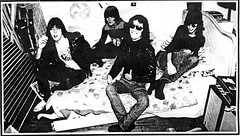
According to Joey, the chorus in "Blitzkrieg Bop" - "Hey ho, let's go" - was "the battle cry that sounded the revolution, a call to arms for punks to do their own thing." That message spread outward from the bowels of New York City to the U.K. and California, across Asia, into Latin America and Europe, instigating 10,000 new bands along the way. Lean, mean, clean, the Ramones had ushered in a glorious new age. The critics called it punk rock after the garage bands of the early 1960s. History was rewritten; bands like T-Rex, the Velvets and Dolls were reclassified as "prepunk." New sights, sounds, dress codes, art, attitudes and gender relations followed - girls could do it, too! Fans in the audience today became bands onstage tomorrow. Authenticity replaced virtuoso mastery as the central tenet of punk musicianship. The Ramones set the standard for a rising generation of alternative bands learning to balance cult credibility with mass appeal. From CBGB to Sleater-Kinney, Rancid and Green Day. Stripped down, with a streetwise anti-look, speed-pop raw aggression and darkly funny lyrics, the Ramones influenced genres from new wave to hardcore, speed metal and thrash. Infused the sensibilities of grunge, riot grrrl, foxcore and queercore.
The original band members grew up as disaffected boomers repulsed by the legacy of peace and love. They were loners, outcasts in their outer-borough middle-class apartment complex. Typical neighborhood guys, bassist Dee Dee lived next door to Johnny, who played guitar, and Johnny was in a band with Joey's brother, guitarist Mickey Leigh. Johnny knew Tommy since high school - they had a band called Tangerine Puppets. After graduation, Tommy got a job as a recording engineer, setting up Performance Studios, a rehearsal space and showcase for early Ramones shows, two-dollar cover, mostly friends. In addition to playing drums, Tommy began coproducing, and after the Ramones' third album, Rocket to Russia, he left the band to produce full-time. Dee Dee knew Joey as the singer in a glitter band named Sniper, who performed at a Queens club called Coventry. A free spirit, tall, shy and gawky, Joey seemed a most unlikely rock star. When he hooked up with his band mates, he was selling acrylic-dipped flowers in the Village and painting with vegetables. Like Dee Dee and Johnny, Joey was alienated at home, at school and in the neighborhood. In their early days, Dee Dee and Johnny sat on rooftops killing time, getting wasted, looking for cheap thrills. "Now I Wanna Sniff Some Glue" was Dee Dee's deadpan dead-end kids' one minute, thirty-four second ode to the pleasures of solvent abuse. Joey claimed the song was just a goof: "We were really just writing about teenage frustration." As Johnny explained, "We couldn't write about girls or cars, so we wrote songs about things we knew."
The Ramones were their fans - outcasts, frustrated suburban youth who played stickball, worked at odd jobs and checked out shows at Flushing Meadow Park. Johnny and Dee Dee were obsessed with war movies. Johnny had spent two years in military school; Dee Dee grew up in Germany on a military base, an army brat. Fiercely patriotic, the two collected war memorabilia and hated hippies. They rode the subway to shows, carried their guitars to rehearsals in shopping bags. Legend holds that in the early 1970s, when Johnny first saw the New York Dolls perform, he took one look and declared, "Hey, I can do that!" The rest is U.S. cultural history.
The Ramones took their name from Paul McCartney's alias - Paul Ramone - when his band was called the Silver Beatles. Like most kids stranded on the wrong side of the bridges and tunnels of New York City, the Ramones knew heaven was just a train ride away. So they hopped the subway to Manhattan and eventually found a home on the Bowery, at CBGB.
At first, people wondered if they could play at all, but that wasn't the point; their twenty-minute sets of rapid-fire, under-two-and-a-half-minute songs earned them a recording contract before any of their contemporaries, except Patti Smith.
You had to be sophisticated to realize they weren't d-u-m-b. But if you took them too seriously, you'd miss the point. Joey's clipped words made people wonder if he was serious or just spoofing. He deployed an eccentric phrasing that was wholly unique, a mix of regional Queens dialect and Britboy bastard inflection. Dee Dee and Johnny never smiled; they stood onstage with their legs spread apart, stoic, staring psychotically at their instruments. Sometimes Johnny's white guitar turned totally red; he played with such ferocious fury his fingers bled. Joey sang with the same twisted intensity that lacerated Johnny's hand. Sometimes Dee Dee's bass lines soared past at the speed of light. Their minimalist aesthetic was rooted in Dee Dee's Queens logic: "I think rock & roll should be three words and a chorus, and the three words should be good enough to say it all."
The Ramones' songwriting reflected their obsession with popular culture and all things American - pizza, Carbona, Coney Island, Burger King, chicken vindaloo, surfing, horror movies and soda machines. They helped us laugh at our dysfunctional families, psychotherapists, politicians and piss-poor social skills. Above all, they upheld a belief in the emancipatory promise of rock & roll radio: the Top Forty seven-inch vinyl, three-minute hit single. Unlike the snotty urban art crowd, they loved television, baseball, comic books and cartoons. Joey wrote "Chain Saw" after seeing Chain Saw Massacre, rhyming massacreeeeee with me. Johnny's "I Don't Wanna Go Down to the Basement" was an ode to all the B-movie horror flicks he loved. Likewise, "Pinhead" was a cooperative effort inspired by the 1932 horror film Freaks.
Over the course of eighteen studio and live albums, and more than 2,250 shows, the band remained accessible and local. As Joey explained, "Our fans played a major part in the whole thing. I remember meeting certain artists I admired and them being real obnoxious. That wasn't how I wanted to be." Brooklyn boy Marc Bell, an acclaimed drummer for Richard Hell and the Voidoids, Dust and Wayne County, replaced Tommy on drums in 1978 and became Marky Ramone. The son of a longshoreman turned labor lawyer readily embraced the band's ethic of inclusion. Marky said the most important thing he learned from being a Ramone was "how to treat people right, you know, don't act like a rock star, just be yourself. . . . I hate rock stars." Through it all, the band upheld the primacy of the fans, the importance of the kids, the purity of band-fan relations. Of the people, by the people, for the people.
Over the years, the Ramones worked with Phil Spector, starred in Roger Corman's 1979 movie Rock 'n' Roll High School and wrote the title track to Stephen King's Pet Sematary. American popular culture spawned the Ramones; today their legacy permeates it. Today you'll hear them at football stadiums, as crowds cheer "Hey ho, let's go," and on film soundtracks ranging from The Royal Tenenbaums to Jimmy Neutron.
E Pluribus Unum. The Ramones always called themselves an American band, patriotic, goofy, innocent and too tough to die. Individualistic yet inclusive, eccentric yet populist, the Ramones stood firm, in perfect paramilitary formation, a uniformed assault team, a well-disciplined fighting army. They became one of the most prolific, hard-touring bands in the world. Their all-for-one, one-for-all work ethic prevailed over self-interest or ego. After Dee Dee left the band in 1989, C.J played bass with edgy vitality and great humility. The former U.S. Marine said, "I tried not to look like I'm taking someone else's place, but go up there to do my job and entertain people."
When the band broke up in 1996, the members pursued solo projects - cool new bands, art shows, memoirs, novels, spoken-word tours, films and albums. Tragically, at age 49, Joey Ramone passed away on April 15, 2001, following a lengthy battle with lymphoma. Joey's worldview is evident in his posthumous solo album, Don't Worry About Me, in the upbeat momentum of songs like "What a Wonderful World" and "I Got Knocked Down (but I'll Get Up)." Today the former high school reject is a personal hero. By just being himself, "the King of Punk" gave teenage outcasts everywhere something to believe in, an alternative to killing themselves or blowing up the high school.
The Ramones have given us many brilliant anthems to hang our dreams on. Whether by land or by sea, the Ramones never forgot their primary purpose - to be true to their fans. When they played, we knew they did it for us. They never wavered, never betrayed our faith. Their impact on popular music, their influence on youth subculture cannot be measured in the banal, quantitative language of market shares, chart positions and radio airplay. Like the proud-standing Militia of Lexington who fired the shot that sparked the American Revolution, the Ramones of New York City changed history.
Essay in loving memory of Joey Ramone.
Johnny Heff
Bully for Johnnyby Donna Gaines
(October 2001, Village Voice)
When he met the Bullys in 1998, Marky Ramone liked the band so much he produced their first album, Stomposition. Feral as Deadboys, polished as Professionals, bridge-and-tunnel like the Ramones (three of the original members grew up in my hometown, Rockaway Beach), the Bullys mixed old-school punk with a Gen X face and a strong left hook. Songs chronicled life on suburbia's mean streets. "It's Still My Home" was an oath of blood loyalty, a Celtic warrior's do-or-die pledge to love and defend his turf.
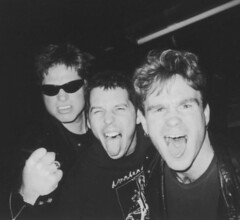
The Bullys already had a show booked for September 22 at their favorite punk palace, the Continental.
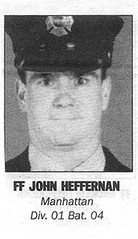
For information regarding donations to the family and future events in honor of FF John Heffernan, log on to the band's Web site at www.thebullys.com or e-mail Walt at thcstack@aol.com.

